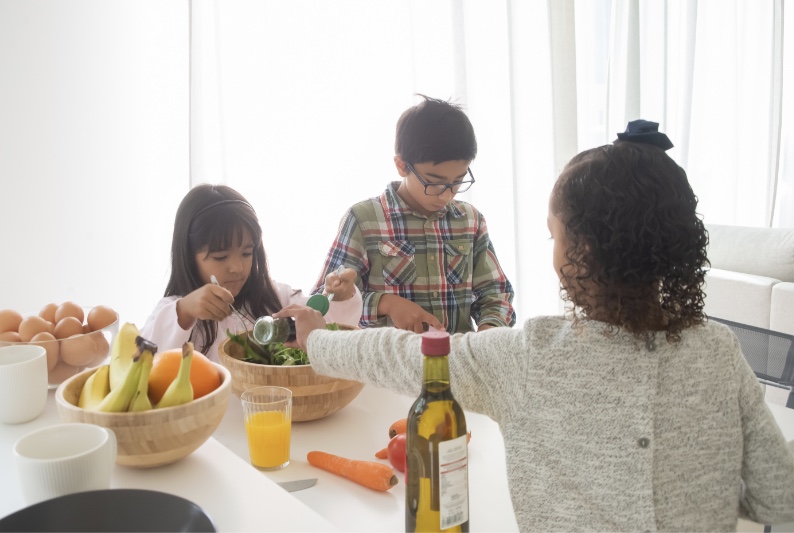I could hear it- the escalation of voices going back and forth. As the arguing grew closer to yelling, I felt a tenseness in the air. I began tiptoeing to where two of my boys were playing, certain I was within seconds of hearing my name screamed. Sure enough, the inevitable, “MOOOOOOOOOM!” came quickly. Can’t these siblings get along?!
Another sibling squabble: feelings were hurt, words were exchanged, good problem-solving strategies straight out the window. Dysfunction. If you’re like me, these sibling arguments are a part of daily life. My four sons are so lucky and blessed to have each other! There is always a playmate. Also, as my boys grow into men, their brothers can become a friend, confidant, and supporter as they walk the path of life. I want them to have positive sibling relationships. However, sometimes it feels like the Hunger Games around here. I’m not always sure everyone is going to make it.
My husband and I have many strategies and ideas to foster a sense of kindness, compassion, and camaraderie amongst our sons. These things are not going to work all the time, but we are laying a foundation for love and friendship. Here are a few tips to help the siblings in your home get along.
ONE-ON-ONE TIME

Spending alone time with each of your sons and daughters is one of the hardest things about being a parent to multiple children. It is, also, an intentional decision that yields big positive results. Children want to be seen and recognized for their individual interests, passions, and talents. They want authentic, undivided attention from the adults in their lives.
One-on-one time doesn’t occur naturally in the daily grind of a busy life. It needs to be planned. Take a child with you to the store. Have a ‘Teen Night Tuesday’ where your oldest can stay up a little later and watch a movie with you. Ask your children what they’d want to do with you if they had thirty minutes or an hour. Write those ideas down and make them happen! Plan small dates with your children- out to a meal or treat, for a bike ride, a play on a playground, a hike in the woods. Pick one weeknight per child where they can read with just you before bed. Time alone with an adult helps children feel the love and connection they desire from their family. This helps to keep positivity in the home. In addition, getting along with siblings is easier when you feel a special relationship with Mom and Dad.
“ME” or “QUIET” TIME
When children are younger and there is a nap time, that is a golden opportunity to spend quality time with older siblings. Nap time is also a helpful reset after sibling arguing and parent frustration. But what happens when kids are older and there is no nap time? Especially during the summer and this pandemic, there were weeks or months when my family didn’t see anyone except each other. Sibling arguments and general dysfunction were at record levels in my home. My kids were sick of each other. It was understandable considering how much time they spent together and only together. A good friend shared with me that her children do a quiet time, alone, every afternoon even when naps were dropped. It blew my mind and we tried it immediately!
In our home, we call it “Me Time.” My children spread out around the house in their own area. They stay in that room and fairly quiet. Sometimes my sons read, color, do puzzles, or play with Legos, Barbies, our pretend kitchen, etc. This has revolutionized our home. “Me Time” gives my children a break from one another, which they sometimes desperately need. Also, it allows each of my sons to foster their own creativity and try things that interest them. Finally, this time shows them the importance of spending time alone. Win-win-win. My boys love coming back together after “Me Time” to share what they were working on and are more eager to play together after the break. It’s been hugely helpful in supporting my sons getting along.
WAIT BEFORE GETTING INVOLVED

Arguments and sibling dysfunction are going to happen. It’s inevitable. It is tempting for a parent to swoop in and play referee or judge. However, in order to help siblings get along, it’s important for parents to stay out of sibling quarrels as much as possible. There are many reasons why an adult jumping in quickly can do a lot of damage to sibling relationships.
First, if adults step in, children do not learn problem solving and compromise. We, as parents, need to provide authentic opportunities to practice these skills. Not only to help sisters and brothers grow their connections to one another, but to help our children get along better with others outside the home as well. People do not have a mediator or judge whenever conflict arrises in the world. Our kids should not have a mediator or judge at their disposal in their home either. Additionally, if parents play referee when siblings fight, our children may perceive us as taking a side or favoring one child over another. This can create contention between a parent and child. It can also cause resentment between siblings. Whenever possible, we need to allow children space and time to hash out disagreements on their own.
If an Adult Gets Involved, be a Sportscaster
A while back I was given great advice when dealing with siblings arguing: be a sportscaster. A sportscaster’s job is to report on what they see. Sportscasters should keep their opinions checked at the door and simply provide observations on what is taking place. When sportscasting during a sibling quarrel, you may say things like, “Hmmm. Two kids want the same train. You are both holding it. I wonder what can be done…?” Or “You weren’t done playing with those markers and now your sister has them.” When we sportscast, we show our children we are here and care. Also, the adult shows trust in the kids to work it out themselves. This is empowering. Lastly, children notice problems often take time to solve. We think and reflect and do not rush to fix it. The more siblings succeed solving problems together, the better they coexist, peacefully, together. Adults staying out of arguments, helps siblings get along.
AVOID COMPARISONS
In every book written about sibling relationships, there is one piece of advice in them all- avoid comparing your kids to one another. It is difficult not to expect, after one child has such a great love of reading, that all the children you have would be avid readers too. When watching one child excel at a sport, you may naturally wonder why their brother or sister can’t catch a ball to save his/her life. When one child is clean or forgetful, musical or thoughtful, parents think about other siblings and how they fit (or don’t fit) into these categories. We are conditioned, from a young age, to compare and categorize. It follows us into parenthood. This natural instinct to compare is dangerous, however, when dealing with siblings.
Every single person living in your home is their own completely unique person. Each child is going to have his/her own interests, passions, strengths, weaknesses, and character traits. It is vital, as parents, that we celebrate each child’s wholeness without comparing them to a brother or sister. When speaking to your children, use statements just about them. Instead of, “your sister did that puzzle yesterday too” say, “you finished the puzzle! I bet you’re so proud of yourself.”
How to Avoid Comparisons
Look out for unique ways each of your children contributes to the family. Maybe you have a son who finds anything that is lost, a son who always knows how to help people feel better, and a daughter who is an amazing sous chef in the kitchen. Give each of those children specific positive feedback. Let them know how grateful your family is that he/she is a part of it. The language we use when talking to our kids and about our kids is important. Children are always listening and always watching. Comparisons and competition happen in so many aspects of children’s lives already, let your home be a resting safe haven where each child can be celebrated for being themselves while working with their siblings, not against them. Avoiding comparisons in your home will help foster positive relationships among brothers and sisters.
LOVE YOUR CHILDREN UNIQUELY, NOT EQUALLY
Lastly, there are times when our children cry out that something “isn’t fair!” Often, we get the definition in our brains that fair means equal. Everyone should have the same chances and have the same experiences. This does not work for families with multiple children! There needs to be a shift that fair is everyone getting what they need instead of everyone getting the same things. From when children are very young, it’s important to celebrate each member of the family as a unique individual. It would be silly to have everyone play soccer if only one person was interested. Similarly, it wouldn’t make sense for the whole family to use a highchair just because a toddler needs it. We are all walking through our own life path and that includes opportunities or experiences that may differ from our siblings.
When a child is upset that something isn’t fair, consider what else he/she may be trying to communicate. Address that unique need instead. For example, if one sibling is frustrated that a sibling got a bigger helping at dinner, simply ask, “Are you still hungry? Would you like more?” Or, when one child is upset because he/she feels an adult is spending more time with a brother or sister, ask, “You’re feeling sad that you’re not spending time with me? I love spending time with you too. Let’s read a special book together after I am done here.” These diffuse a possible argument about equality between siblings. Additionally, it helps children feel heard and listened to. This foundation helps create positive sibling relationships.
Siblings are a Gift
Being intentional about one-on-one time with each of your children, creating space for some quiet time in the day, avoiding comparison, and loving children uniquely, not equally are great tools to foster a home where siblings get along. Each of these strategies help raise children who are problem solvers and cooperators who are loved and celebrated for who they are. These ideas will not eliminate sibling arguing, disagreements, and dysfunction (I’m quite sure that’s an impossible feat), but will help support your children in developing healthy and positive relationships with their brothers and sisters. We adults have a lot of power and responsibility in helping our children see what a sensational gift siblings truly are!
One of the most powerful books on sibling relationships is Siblings Without Rivalry: How to Help Your Children Live Together So You can Live Too by Adele Faber and Elaine Mazlish.
To help continue to foster positive relationships among siblings read Teaching Children About Being Thankful











